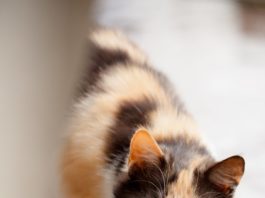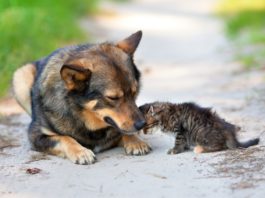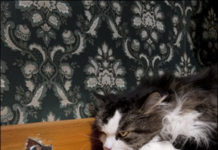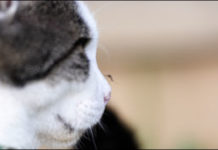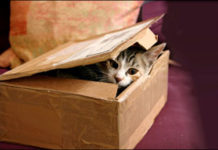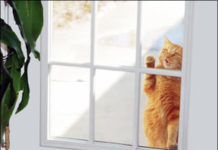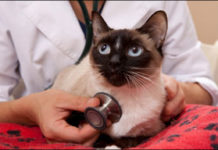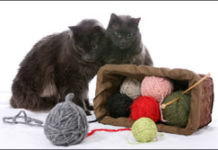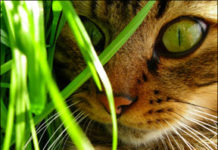The Meaning of the Mouse
Does your outdoor cat regularly deposit small, dead rodents on your doorstep? Or does your indoor cat seem to take pride in hunting down large, ugly bugs in your apartment and leaving them at your feet? Believe it or not, your cat is not bringing you a gift, according to animal behaviorists. "Your cat is actually bringing you a mouse to teach you to hunt and kill it," explains Katherine A. Houpt, VMD, the former James Law Professor of Animal Behavior at Cornell Universitys College of Veterinary Medicine. "Its the same thing the mother cat does for her kittens." Cats are born with a chasing and hunting instinct, but not necessarily the skills to go along with it. The mother cat teaches her kittens to kill and eat prey. (Indoor cats may chase and kill mice, but they will rarely eat them.)
Your Cats Whiskers
The old-fashioned term "the cats whiskers" means the height of perfection or first-rate. Popular in the 1920s, this expression, along with "the cats meow," referred to the daring flappers described as "impossible to shock." While the term is American in origin, people have disagreed over who deserves credit for coining it. Regardless, the phrases meaning shows that the people who first used the expressions certainly understood the unique capabilities of your felines most sensitive hairs. Cat whiskers - also called tactile hairs - are found on your cats eyebrows, chin, cheeks and in an area behind its forelegs above the paw. They are two to three times thicker than other hairs and taper to a fine, flexible tip. Approximately 12 of these stiff bristles align in four rows that protrude from either side of the cats muzzle. The top row moves independently of the middle row.
Your Cats Strange Table Manners
If your cat has ever scratched the floor before or after eating a meal, attempted to cover uneaten food, or plopped a favorite toy into her food or water dish, please raise your hand. Right now, many of you are probably waving your hand in the air and nodding your head knowingly. If suppertime at your house has more the ambience of a junior high school cafeteria than a chic caf, read on. Our Cornell experts help make sense of some of our cats quirkiest food-related behaviors. Eating Etiquette. Scratching around their bowls or trying to cover food is a common, albeit puzzling behavior seen in many cats. Just why our fastidious felines do this remains a mystery, but several theories have been suggested.
Making a Move With Your Pets
Moving day can be a miserable, hectic blur - one of those times youd like to be able to just twitch your nose and be done with it. Unfortunately, it just isnt that easy. And cat owners have the added stress of worrying about how their cat(s) will react to the disorder and mayhem. However, there are several precautions that can be taken to help ensure that your pet will remain safe during the move and to promote a quick adjustment to his new home.
Do Our Cats Actually Train Us?
Do you ever find yourself playing servant to your cat? Maybe youre working on the computer and your clever cat lies down across the keyboard to get your attention. Next thing you know, youre stroking the cat instead of striking the keys. Perhaps youre watching TV, sleeping or just relaxing and your feline rubs up against your leg, hand or even face to let you know its time to eat. Or your cat may follow you from room to room, pausing to wind around your ankles. Sometimes cats, after getting the attention of their human companions, actually lead them to their food dishes. So what do you do? You feed your cat, of course. The loud purring that follows is music to your ears.
Does Your Cat Need Help?
Inappropriate urination or defecation. Aggression. Inappropriate scratching or destructive behavior. Eating or chewing non-food materials. Cat carrier avoidance. Separation anxiety. Other fears and phobias. When your cat develops a behavior problem, you may need professional advice. But whom should you call? Your veterinarian should be first on the list. But for particularly difficult problems, he or she may enlist the help of a certified applied animal behaviorist or a board-certified veterinary behaviorist. While either one can help you solve your cats adjustment difficulty, there are some differences in the services each provides.
How to Help Your Grieving Cat
Ever since one of your beloved cats died several weeks ago, youve been feeling pretty down. People who have been through the same experience tell you this is normal after such a loss. But then you notice that your other cat is eating a lot less, doesnt play like he used to and wanders around the house, yowling, as if he was looking for his lost companion. Do cats grieve like we do? And if so, are there things we can do to help them? Animals and Emotions. Its only within the last ten years or so that scientists have begun to recognize that animals lead rich emotional lives. There is evidence that cats and other animals experience emotional responses to significant changes in their environment - and this includes going through the grieving process after the loss of feline or human companions. "What is important for people to realize is that the same brain neurochemistry that allows humans to feel is the same neurochemistry that many animals have - including cats. Cats can mourn," says Katherine Houpt, VMD, PhD, the James Law Professor of Behavior Medicine at Cornell Universitys College of Veterinary Medicine.
Keep a Feline Health Diary
If your cat kept a diary, it might read something like this: Yesterday, I slept, ate, slept some more, chased a paper ball, napped, ate again and napped. While that may describe a cats typical day, it wont necessarily help you or your veterinarian if your cat develops a health or behavior problem. "Keeping a diary for your cat is a good idea in general, but particularly when your cat is ill," says Drew Weigner, DVM, who is board-certified by the American Board of Veterinary Practitioners. Keep Track of the Basics. At a minimum, you should track your cats veterinary visits, vaccinations, flea treatments and any medications your cat takes. Beyond that, record anything that is unusual for your particular pet. For example, if you change your cats diet, note the date and track changes (such as vomiting or diarrhea). Or, if your cat urinates more or less often than usual, record that in the diary. "If there is anything unusual, or if you start seeing something more often, you should take a trip to the veterinarian," says Dr. Weigner, whose practice is The Cat Doctor in Atlanta, Georgia. If your cat exhibits any changes in behavior, you should note anything unusual thats happened in the house, such as human visitors or changes in the environment. Are strange cats hanging around outside? "Anything can act as a trigger," says Dr. Weigner. "Keeping a journal helps separate the subjective from whats objective. If you keep a log of it, you know for sure."
Take Your Cat for a Walk!
Lucky, a striking gray tabby with bright green eyes, touches blades of grass, rolls around on the sunny deck and strolls over to sniff blackberry branches. Its all part of his regular walk around the fenced backyard with his human companion, who supervises his short outings. Since he is not particularly agile, his owner doesnt worry about quick escapes or even a leash. Buckys feline buddy, however, is a different matter. Jade, an agile black cat, loves the great outdoors as much as Bucky, but her athletic prowess easily has her up, up and away in a matter of seconds. Walking Jade outside requires an appropriate harness and leash. Whether you live with a Jade or a Bucky type, walking your cat will bear little resemblance to a conventional walk with the dog. Your cat probably will not like striding along at a brisk pace on a concrete sidewalk. That doesnt mean, however, that taking a walk with your cat isnt a great idea.
Stressful Times Impact Our Pets, Too
To you ever wonder if any of the anxiety and tension you sometimes bring home can also affect your pets? These challenging economic times can indirectly be hard on our cats, too. Experts feel that cats will indeed react to changes in the emotional behavior of their owners. So, if we believe that cats can sense our stress - and we certainly are living in an era of increased worry and anxiety - it stands to reason that our cats are experiencing higher levels of stress, as well. At what point are our feline friends exposed to more stress then they can handle?
Be A Good Neighbor … With Pets
Outdoor hazards - such as dogs, coyotes, cars, and disease - face cats that are allowed to roam outdoors. Most veterinarians, including those at the Cornell Universitys College of Veterinary Medicine, strongly recommend that cats be kept indoors. But if your cat does travel beyond your front door, its likely to wander onto the property of your neighbors. While some people will welcome feline visitors, others wont. What can you do to honor your cats need to roam - and respect your neighbors rights, too? To choose the best method for dealing with a problem, observe your cats behavior carefully to clarify the issue. For example, one womans cat coexisted peacefully with a backyard bird feeder until it suddenly killed three birds in one week. Upon investigation, she discovered that melting snow had left a depression in the ground. The depression prevented the birds from seeing the cat when it crouched in the hole, making them vulnerable to attack. Once the hole was filled in, the birds were safe again.
Cats Eyes: Exquisitely Fascinating
Ever feel like you could get lost in your cats eyes? Although we usually associate cats eyes with the color green, they actually come in many colors. They can range from blue to copper, with a variety of blue-green shades in between. (But all kittens are born with blue eyes - the same as human babies.) The color of the iris (the oval area around the pupil) is caused by the pigment melanin, and in cats it ranges from very pale yellow or tan to deep orange or brown. "The eye also derives some pigment from the retina in the back of the eye, causing a blue-grayish color," says Paul Maza, DVM, of the Department of Biomedical Sciences in Cornell Universitys College of Veterinary Medicine. The end result can be compared to putting a sheet of blue-gray glass over the iris, thus resulting in your cats unique eye color. Since a cats eye color depends on several genetic factors, one set of feline parents can produce a wide range of eye colors in their kittens.




